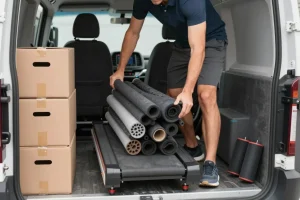Can You Transport a Body Yourself?
Transporting a body yourself can be complicated and emotionally challenging․ Understanding legal aspects, necessary permissions, and logistics involved is crucial for ensuring compliance and respecting the deceased and their family during this difficult time․
Body transportation refers to the process of moving a deceased individual from one location to another, often necessitating careful planning and consideration․ This can involve a variety of methods including cremation, burial, or self-transport․ Families may face logistical challenges as they navigate the complexities of funeral arrangements, while also dealing with their own grief and emotional distress․ The transportation of a body is subject to various regulations and laws that govern how remains are handled, ensuring safety and respect for the deceased․ Understanding the procedures required for obtaining a death certificate, consent for transportation, and authorization for autopsy, if necessary, is essential․ Additionally, families must consider the involvement of law enforcement and jurisdictional requirements, which can vary widely․ Mortuary services often provide support in this process, helping families make informed decisions about their options․ Ultimately, the decision to transport a body oneself must weigh personal responsibility against the need for professional assistance during a challenging time․
Legal Issues Surrounding Body Transportation
When considering whether to transport a body yourself, understanding the legal issues involved is crucial․ Various laws regulate the movement of remains, which can differ significantly by jurisdiction․ Typically, consent from family members and proper identification of the deceased is required before transportation․ Additionally, a death certificate must be obtained, which serves as legal documentation of the individual’s passing․ In some cases, an autopsy may also be mandated, particularly if the cause of death is unclear or involves legal investigation․ Failure to comply with these regulations can lead to legal consequences, including fines or criminal charges․ Furthermore, law enforcement may need to be notified depending on the circumstances surrounding the death․ It is also essential to consider any local or state regulations regarding the use of hearses or other vehicles for transport․ Consulting with a legal professional or a funeral home can provide clarity on these matters, ensuring that you adhere to all necessary laws while managing emotional distress during this challenging time․
Understanding Mortuary Services
Mortuary services play a crucial role in the process of handling deceased individuals, offering expertise in various aspects of body transportation․ These services typically include embalming, which preserves the body for viewing, and helps families navigate the often overwhelming logistics involved in funeral arrangements․ When families are faced with grief and emotional distress, morticians provide support by assisting with transportation, whether it involves cremation, burial, or self-transport options․ They ensure that all legal requirements are met, including obtaining necessary permits and maintaining compliance with safety standards․ Additionally, mortuary services often handle the coordination of hearses for transporting the deceased, easing the burden on grieving families․ Understanding the full scope of mortuary services can help families make informed decisions during this difficult time․ Families may also benefit from the compassionate guidance offered by professionals who understand the intricacies of regulations related to the handling of remains․ Overall, mortuary services serve as a vital resource for families navigating the complexities of death and memorialization․
Funeral Arrangements: Options for Transportation
When organizing funeral arrangements, families must explore various options for transporting a body․ The most traditional method involves using a funeral home, which typically provides hearses specifically designed for this purpose․ These vehicles ensure safe and respectful transportation, complying with legal regulations․ However, some families may consider self-transportation as an alternative, which requires understanding the logistics involved, such as obtaining necessary permits and ensuring proper handling of remains․ If opting for self-transport, families must also be mindful of safety procedures to prevent emotional distress and legal complications․ Additionally, transportation may vary depending on the choice of burial or cremation, influencing how the body is moved․ Consultation with mortuary services can aid in making informed decisions about transportation options․ Each choice carries implications regarding the deceased’s dignity, family preferences, and emotional well-being․ By weighing these factors carefully, families can navigate their options effectively while honoring their loved ones’ final wishes during this profoundly challenging time․
Self-Transport: What You Need to Know
Self-transporting a body can be a challenging decision, requiring careful consideration of various factors․ Families should first understand the legal implications of this choice, including the need for proper identification and a death certificate․ Consent from family members is vital, and they must be aware of the emotional and logistical challenges involved in self-transportation․ It’s essential to ensure that the body is handled with dignity and respect throughout the process․ Families should also familiarize themselves with local regulations regarding the transport of remains, as these can vary significantly by jurisdiction․ Safety is paramount; using a suitable vehicle and ensuring the body is secured properly will help avoid complications․ If any complications arise, having a plan for engaging with law enforcement can provide peace of mind․ Additionally, families should consider the emotional distress this choice may cause, as the process can be overwhelming․ Ultimately, weighing the pros and cons of self-transportation will help families make the right decision for their circumstances․
Regulations and Compliance
Transporting a body, whether through a funeral home or via self-transport, is governed by stringent regulations and compliance requirements that vary across jurisdictions․ Understanding these regulations is crucial to ensure that all legal obligations are met․ Transporting remains typically requires a valid death certificate and may necessitate permits issued by local authorities․ Failure to comply with these legalities can result in significant penalties, including fines or criminal charges․ Additionally, regulations often dictate how remains should be handled during transport, including requirements for embalming, refrigeration, or secure packaging․ Families must also be aware of any specific transportation laws regarding vehicles used, as hearses are often preferred for their design and compliance with safety standards․ Law enforcement may also need to be notified in certain circumstances, particularly if there are questions regarding the cause of death or other legal issues․ Familiarizing oneself with these regulations not only ensures legal compliance but also promotes a respectful and dignified transportation process for the deceased․
Handling and Safety Procedures
Handling a body during transportation requires strict adherence to safety procedures to ensure both legal compliance and the dignity of the deceased․ Firstly, proper identification of the remains is essential, including using tags that clearly indicate the individual’s name and relevant details․ When preparing for transport, it is crucial to maintain the body’s integrity, often necessitating embalming to prevent decomposition․ Using a suitable vehicle, preferably a hearse or a specialized transport van, ensures that the body is secured and protected during transit․ Families should ensure that the vehicle is clean and respectful․ Additionally, safety measures must include securing the body properly to prevent any movement during transport, which can be distressing․ It’s also important to consider the emotional state of everyone involved, as this process can evoke grief and distress․ Having a plan to handle any unexpected situations, such as law enforcement interactions, is wise․ Ultimately, following these protocols can facilitate a respectful and safe transport experience for all parties involved․
Emotional Considerations and Family Grief
Transporting a body, particularly by oneself, brings forth significant emotional considerations that families must navigate during a time of grief․ The process can evoke intense feelings of sadness, loss, and distress, making it crucial to approach the situation with sensitivity․ Engaging in self-transport can add layers of emotional burden, as family members not only cope with their grief but also manage the logistics of transportation․ The sight of a loved one’s remains may trigger profound sorrow and anxiety, emphasizing the need for support systems․ It’s vital for families to communicate openly about their feelings and concerns, allowing for shared understanding and collective coping․ Seeking assistance from professionals, such as mortuary services, can alleviate some emotional strain by providing guidance and support․ Acknowledging the varying ways individuals grieve is essential; some may prefer hands-on involvement, while others may find it too overwhelming․ Ultimately, prioritizing emotional well-being during transportation decisions can foster a supportive environment for all family members affected by the loss․
Deciding whether to transport a body oneself involves significant personal responsibility that encompasses legal, emotional, and logistical considerations․ Families must carefully weigh their options, recognizing the complexities involved in self-transportation․ It’s essential to understand that this choice carries implications not just for the deceased but also for the grieving family members who may be emotionally impacted by the process․ Adhering to legal requirements, including obtaining necessary permits and ensuring compliance with safety regulations, is paramount to avoid potential legal repercussions․ Moreover, the emotional toll associated with handling a loved one’s remains should not be underestimated; families should assess their own readiness to cope with this task․ Engaging with mortuary services can provide valuable support and relieve some burdens, allowing families to focus on their grief․ Ultimately, the decision to self-transport should be made with careful consideration of all factors, ensuring that the dignity of the deceased is upheld while acknowledging the emotional needs of those left behind during this challenging time․













Post Comment